[ad_1]
What’s the finest tent materials to purchase?
The reply is straightforward…All of it comes right down to the sort of tenting journeys you’ll be occurring.
Planning a backpacking journey? Weight can be on the high of your checklist of priorities.
Automotive tenting? You could be extra involved about breathability and UV resistance.
Going tenting in tough terrain? You’ll wish to ensure that your tent is fabricated from a extremely sturdy materials.
Frequent tenting tent supplies you’re more likely to come throughout in your search embody:
- Nylon
- Polyester
- Canvas
- Polycotton
- Cuben Fiber
However in the event you’re merely searching for the most effective materials, Dyneema Composite Cloth (DCF) – previously often called Cuben Fiber is by far and away the most effective tent cloth that cash should buy.
As soon as the professionals and cons of every cloth, you must have a greater thought of which one is finest for you, based mostly on your priorities.
What Is The Greatest Tent Materials?
There isn’t a one finest tent materials for tenting out available on the market. Each materials has its professionals and cons which decide when it’s finest used.
General, we agree that Dyneema Composite Cloth (DCF) – previously often called Cuben Fiber – is nice in a number of classes. It’s waterproof, gentle in weight, and really sturdy.
And in the event you’re searching for a tent with these particular traits, then this materials is the most effective.
Nonetheless, needless to say the place DCF shines in these classes, there are some ways in which it lacks. For instance, it’s much less sturdy and dearer than different tent materials.
So, if these two classes are actually essential to you, you must contemplate one of many two artificial supplies, nylon or polyester.
Each of those supplies come slightly near DCF in lots of classes, so that they’re each a extremely good choice for a tent.
General, there may be definitely a tent cloth that’s simply best for you, and as we speak, we’re going that will help you by evaluating all the professionals and cons of every tent cloth.
Greatest Tent Materials By Operate
| Operate | Materials |
| Most Sturdy | Polycotton |
| Most Waterproof | DCF |
| Lightest | DCF |
| Most Eco-Pleasant | Canvas (natural cotton) |
| Least expensive | Polyester |
| Most Costly | DCF |
| Strongest | DCF |
Sturdiness & Longevity
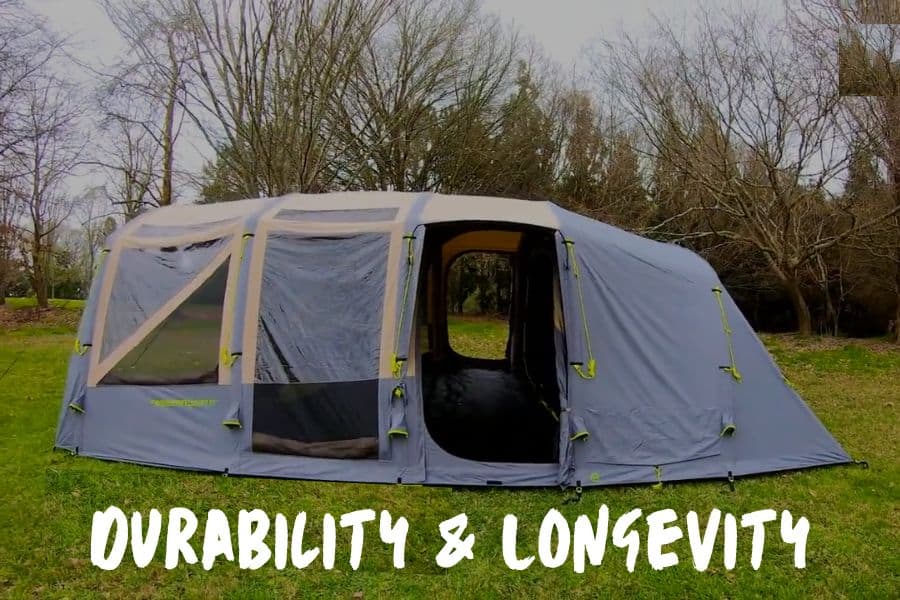
With regards to sturdiness, polycotton wins. It combines the most effective traits of each polyester and cotton.
Cotton fibers are already very sturdy, and they’re additional fortified with polyester fibers to forestall ripping or tearing.
Moreover, polycotton has nice UV resistance. This cloth will fade and degrade at a a lot slower tempo than polyester or cotton would on their very own.
Waterproofing
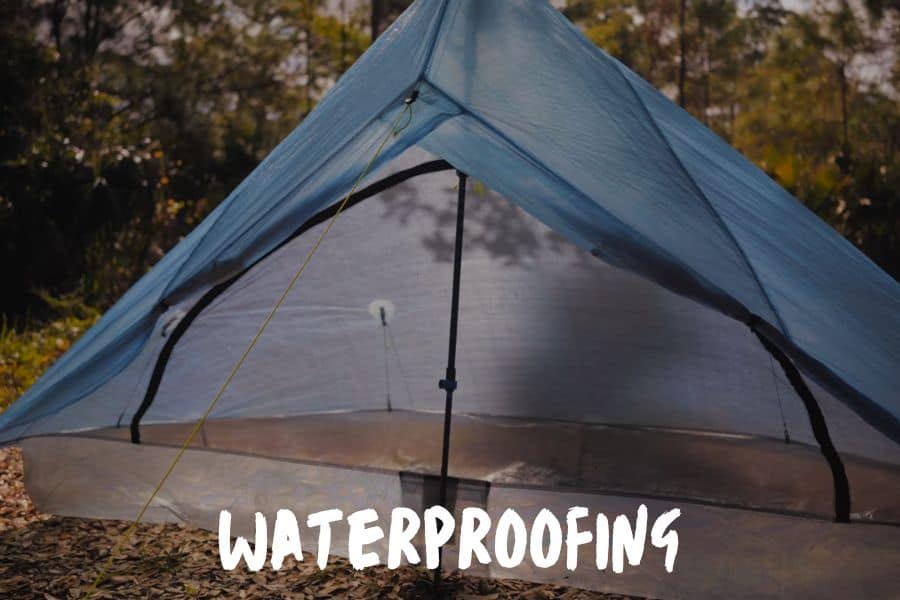
As for the waterproofness, it’s clear which materials wins on this class: Dyneema Composite Cloth (DCF).
In contrast to some other materials we talked about, DCF doesn’t take up water – not even the tiniest bit.
As a substitute, the water drops merely glide off the material onto the bottom. For that purpose, it doesn’t want any extra coating, in contrast to different supplies.
Additionally learn: How To Waterproof A Canvas Tent
Price & Affordability
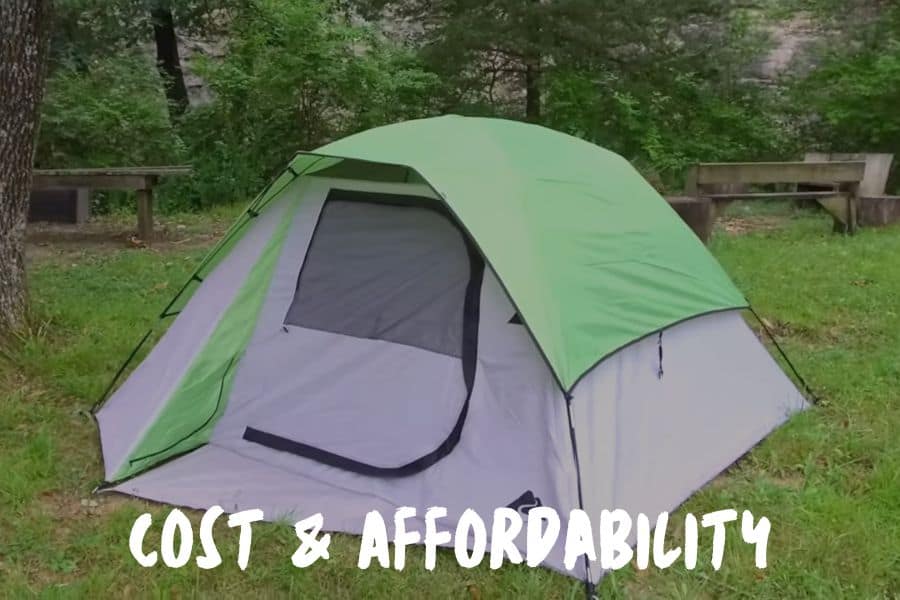
Amongst all of the tent materials, polyester is probably the most inexpensive choice.
Polyester manufacturing is extraordinarily cheap because it solely includes petroleum, coal, water, and air.
In comparison with nylon, one other artificial materials, the polyester manufacturing value is sort of halved.
Additionally learn: High 9 Greatest Tents Beneath $100 (2023 Purchaser’s Information)
3-Season Vs. 4-Season
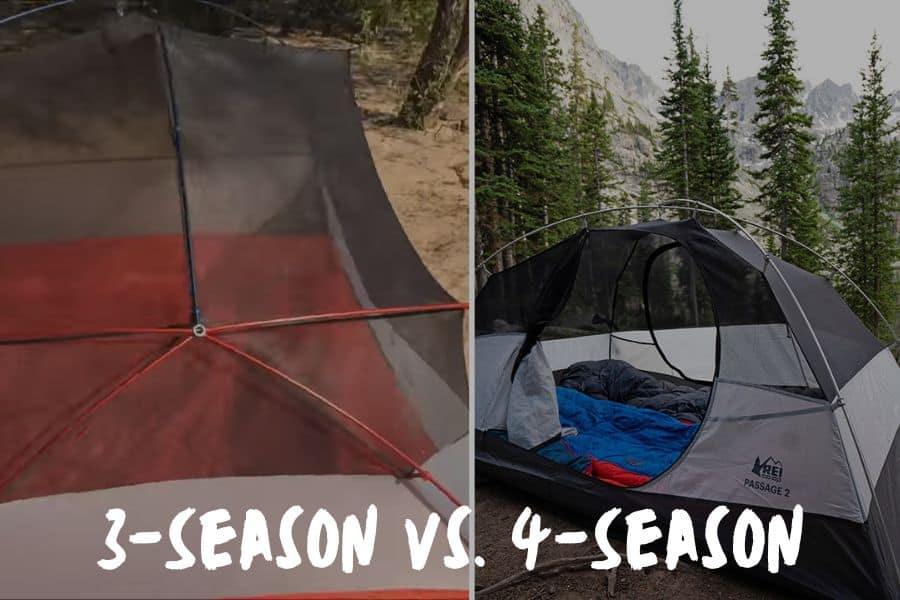
Whereas 3-season tents work with a wide range of supplies, the best choice for a 4-season tent is ripstop nylon.
Nylon traps warmth higher in comparison with different materials, which is a characteristic you completely need in a winter tent.
Nonetheless, common nylon would sag and stretch from snow and winds, which is why ripstop nylon works higher right here.
Light-weight Supplies
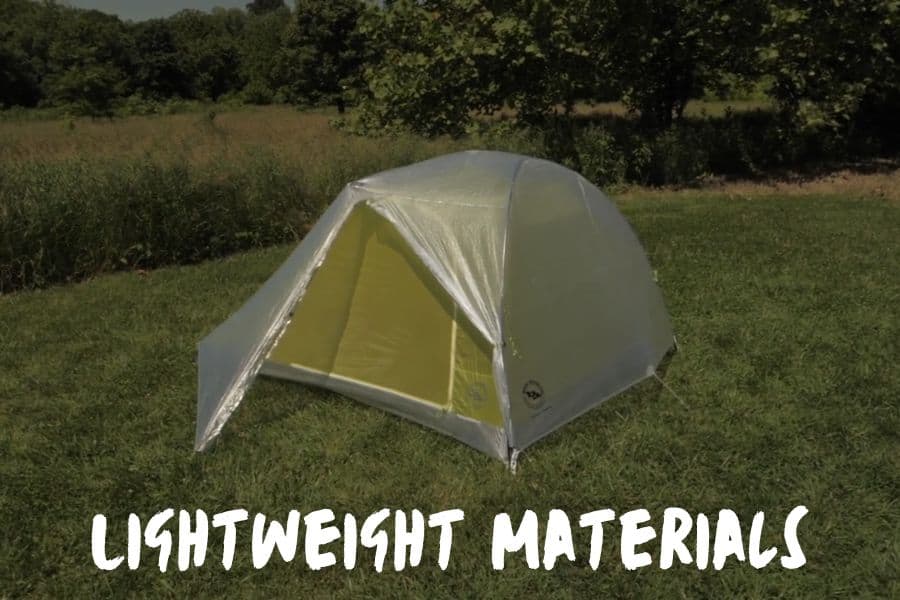
With regards to materials weight, Dyneema Composite Cloth holds a well-deserved first place.
Till the invention of this cloth, nylon was the fabric reserved for backpacking tents.
Nonetheless, since DCF weighs as much as 30% lower than nylon, it grew to become the material of alternative for ultralight tents.
Plus, because it doesn’t take up water in any respect, in contrast to some other materials, it doesn’t achieve weight when sagged.
However don’t be fooled by the featherweight of DFC, as this materials is extremely sturdy for its weight.
With that being stated, let’s not overlook in regards to the drawbacks that include this cloth. These are weak to tears and abrasions, are increased in value, and are massive when packed.
Environmental Impression
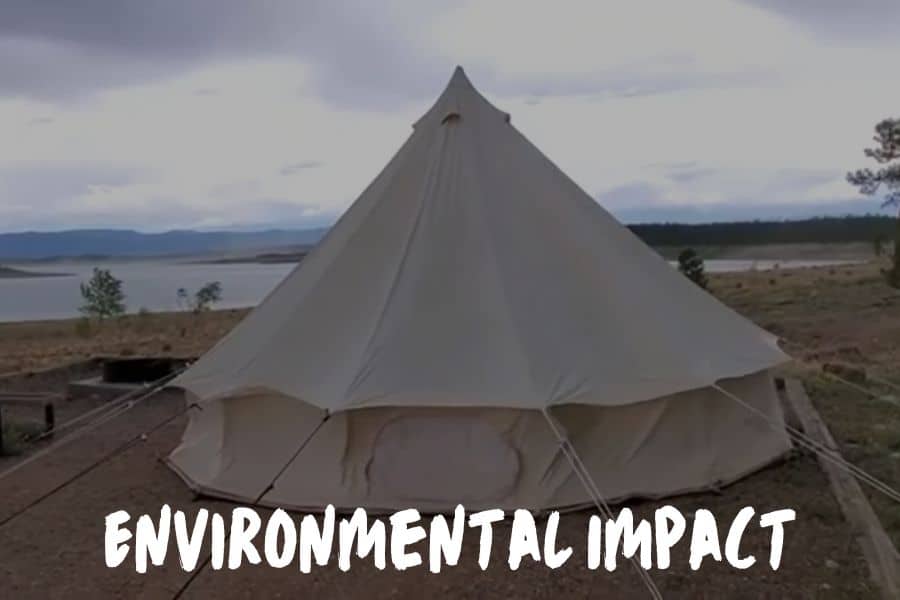
Discovering the winner on this class just isn’t as easy as it could appear.
Despite the fact that it’s fabricated from pure fibers, cotton just isn’t a really environmentally pleasant cloth. First, it requires quite a lot of water to develop – 5,300 gallons for mere 2 lbs of cotton!
What’s extra, a lot of the cotton grown globally just isn’t natural, which suggests it includes genetically modified seeds and chemical compounds.
We should additionally think about that cotton received’t final anyplace close to so long as artificial supplies, like polyester or nylon.
So, it makes extra waste in the identical period of time. Plus, making artificial supplies requires approach much less water.
Nonetheless, artificial supplies:
- Are derived from fossil fuels.
- Require chemical compounds in manufacturing.
- Aren’t biodegradable.
So, what’s the fabric with the least environmental affect, then?
Properly, that may be natural cotton. Producing natural cotton addresses most eco-challenges common cotton manufacturing faces.
Not solely does it keep away from utilizing chemical compounds, but it surely additionally includes ancestral farming strategies that protect soil.
Natural cotton tents aren’t as frequent as their non-organic counterparts. However, they’re undoubtedly a sensible choice in the event you’re involved in regards to the environmental affect of your tent.
A Fast Comparability Of Tent Materials
| Materials | Professionals | Cons |
| Nylon | very light-weight, sturdy, quick-drying | restricted water resistance, stretches over time, dangerous UV resistance |
| Ripstop Nylon | very breathable, quick-drying, light-weight, tear-resistant | heavier than nylon, restricted water resistance |
| Polyester | inexpensive, sturdy, UV-resistant, stretch-resistant | heavy, susceptible to ripping |
| Ripstop Polyester | extremely tear-resistant, sturdy, quick-drying | heavy |
| Canvas | very breathable, UV-resistant, well-insulated, waterproof | very heavy, slow-drying, costly, vulnerable to mildew |
| Polycotton | breathable, extremely sturdy, mildew-resistant | heavy, costly |
| DCF | extremely waterproof, stretch-resistant, patchable, extraordinarily light-weight | Costly, low sturdiness |
FAQs
What Is The Greatest Waterproof Tent Materials?
In contrast to different supplies, DCF is totally waterproof and lets water slide off the material, as a substitute of absorbing it.
What Is The Strongest Tent Materials?
DCF has the strongest fibers of all of the tent supplies. In reality, it’s thought of to be one of many strongest fibers on this planet, at 15x the energy of metal per weight.
Do UV Rays Have an effect on Tent Cloth?
After all, solar rays degrade tent cloth like some other materials.
Nonetheless, not all materials degrade on the identical tempo. As an illustration, nylon has a a lot decrease UV resistance than polyester.
What Is Ripstop Tent Cloth & Is It Good?
Ripstop cloth has a crosshatch weave sample, which will increase its resistance to ripping and ripping.
Mainly, it has a stronger thread woven right into a grid sample to forestall holes from getting larger.
What Is Dyneema Tent Cloth & Is It Good?
In contrast to different supplies, Dyneema just isn’t woven. It’s sandwiched between outer layers of polyester movie that’s then melded collectively in a high-pressure autoclave.
This materials has nice energy, waterproofness and low weight.
What Is The Lightest Weight Tent Cloth?
Dyneema is the lightest tent cloth available on the market. In comparison with nylon, one other gentle materials, Dyneema can weigh half of nylon’s weight.
What Is The Strongest Tent Cloth?
Amongst tent materials, DCF has the most effective strength-to-weight ratio.
Are There Any Distinctive Security Concerns Related With Particular Tent Supplies?
Take into account that not all tent materials have the identical properties. As an illustration, canvas could also be extra waterproof than another artificial supplies, but it surely requires seasoning.
Likewise, Dyneema would be the strongest cloth, but it surely’s not as sturdy as different ones.
The Remaining Verdict
Which cloth is the most effective? Properly, as you may see, there isn’t one proper reply. All of it relies on what your high priorities are.
For those who’re a backpacker searching for a light-weight tent that received’t weigh you down, nylon is the best way to go.
Excessive adventurers tenting in tough terrain would in all probability be higher off going for polyester.
Automotive campers can go for something actually, together with canvas tents, which is a wonderful alternative in the event you don’t thoughts the additional weight.
And naturally Dyneema Composite Cloth (DCF) is the most effective of all of them!
Hopefully, you’ve now obtained a clearer image of the most effective tent materials for you. Pleased tenting!
Extra on Tents:
[ad_2]

